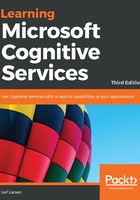
Knowledge
When we talk about knowledge APIs, we are talking about APIs that allow you to tap into rich knowledge. This may be knowledge from the web or from academia, or it may be your own data. Using these APIs, you will be able to explore the different nuances of knowledge.
The following four APIs are contained in the knowledge API domain.
Project Academic Knowledge
Using the Project Academic Knowledge API, you can explore relationships among academic papers, journals, and authors. This API allows you to interpret natural language user query strings, which allows your application to anticipate what the user is typing. It will evaluate what is being typed and return academic knowledge entities.
This API will be covered in more detail in Chapter 8, Query Structured Data in a Natural Way.
Knowledge exploration
The knowledge exploration API will let you add the possibility of using interactive searches for structured data in your projects. It interprets natural language queries and offers autocompletions to minimize user effort. Based on the query expression received, it will retrieve detailed information about matching objects.
Details on this API will be covered in Chapter 8, Query Structured Data in a Natural Way.
Recommendations solution
The recommendations solution API allows you to provide personalized product recommendations for your customers. You can use this API to add a frequently-bought-together functionality to your application. Another feature that you can add is item-to-item recommendations, which allows customers to see what other customers like. This API will also allow you to add recommendations based on the prior activity of the customer.
We will go through this API in Chapter 7, Building Recommendation Systems for Businesses.
QnA Maker
The QnA Maker is a service to distill information for frequently asked questions (FAQ). Using existing FAQs, either online or in a document, you can create question and answer pairs. Pairs can be edited, removed, and modified, and you can add several similar questions to match a given pair.
We will cover QnA Maker in Chapter 8, Query Structured Data in a Natural Way.